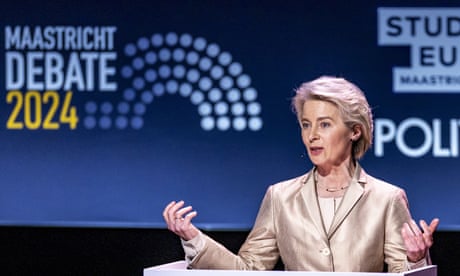
The European Commission’s president, Ursula Von der Leyen, has criticised the far-right as “Putin’s proxies”, while refusing to rule out working with other rightwing nationalists, as campaigning began ahead of June’s European elections.
Von der Leyen is seeking a second five-year term leading the commission, in the looming reshuffle of EU top jobs that follows the European elections.
At a debate in Maastricht on Monday with rivals from across the political spectrum, von der Leyen went on the attack against the far-right Identity and Democracy group in the European parliament, which unites France’s National Rally, the Alternative für Deutschland (AfD) and the Danish People’s party.
The ID group is expected to make significant gains in the pan-European vote on 6-9 June and could even become the third largest force, threatening key EU policies such as support for Ukraine, climate action and enlargement.
Addressing the far-right representative Danish People’s party’s Anders Vistisen, von der Leyen accused his allies in the AfD of being supporters of Russia’s president, Vladimir Putin, saying their electoral programme echoed “the lies and propaganda of Putin”.
“It is very important that we should not be distracted from the real problem: and these are the proxies of Putin who try to destroy from within with disinformation and polarisation. And we see an example here tonight,” Von der Leyen said, gesturing to Vistisen.
But the commission president was far more guarded about closing down alliances with the hardline conservative European Conservatives and Reformists group, which unites Italian prime minister Georgia Meloni’s Brothers of Italy party, Poland’s Law and Justice party and Spain’s far-right Vox party. “It depends very much on how the composition of the parliament is and who is in what group,” von der Leyen said.
The ECR, which did not send anyone to the Maastricht debate, has described the EU’s green deal as sometimes “dogmatic, anti-economic and antisocial”.
Von der Leyen’s centre-right European People’s party is forecast to remain the largest force in the European parliament, followed by the Party of European Socialists in an election where the centre-left and Greens are both expected to lose ground.
While eight candidates taking part in the debate have declared an interest in leading the European Commission, Von der Leyen is the only one with a serious shot at the job.
During the 90-minute debate, she showed a more impassioned side than her usual scripted public persona, especially when it came to Russia’s invasion of Ukraine and the Israel-Gaza war.
She criticised a suggestion from radical left candidate Walter Baier that the Ukraine war could end if both sides negotiated. “I am getting tired of hearing that,” she said noting she had been seven times to Ukraine and had seen the body bags at Bucha, where hundreds of civilians were killed by Russian forces. “If you want to end this war Putin just has to stop fighting and then the war is over.”
Turning to the war in Gaza, where she faced criticism from the left over the EU’s stance on Israel, she said Israel had the “right to defend itself within the limits of humanitarian law and international law”, adding that it was “unbearable” and “unacceptable” to see how many innocent civilians were dying, especially children.
Defending her record on the EU’s green deal, she also hit back at the Green’s lead candidate, Dutch MEP Bas Eickhout, who accused the commission of “lowering green standards” after it withdrew a proposal to cut pesticide use and watered down nature protection measures, following farmer protests.
“Instead of pushing hard to polarise I would invite you to listen to this dialogue,” she said to Eickhout, raising a question about how far she intends to court Green MEPs for support.
EU leaders will ultimately choose the next European Commission president, but that person will need the support of a majority of MEPs. In an attempt to wrest control over that appointment, the European parliament favours the so-called spitzenkandidaten system, where Europe’s political parties present their choices to lead the EU executive.
In 2019 at the behest of France’s president, Emmanuel Macron, EU leaders side-stepped the spitzenkandidaten process, passing over the EPP’s victorious lead candidate Manfred Weber, in favour of Von der Leyen, who had not taken part in any of the pre-election debates or even declared herself interested in the job.
She subsequently became commission president, after winning support from a coalition spanning the centre-right, centre-left, liberals and greens in the European parliament.